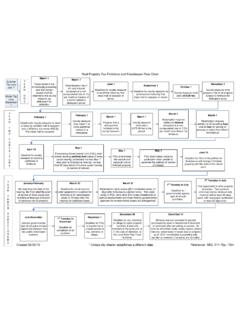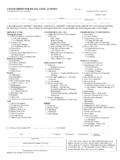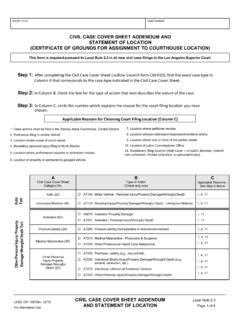Transcription of State Tax Commission of Missouri - Lawrence …
1 State Tax Commission of Missouri Chapter 140. Tax Sale Procedure Manual*. * Section RSMo. 2000, giving the State Tax Commission authority to decide questions concerning the construction and interpretation of Chapter 140, has been repealed. This material is provided for informational purposes only and should not be relied upon without first speaking to your county counselor or prosecuting attorney. This manual does not deal with tax sales under Chapter 141 RSMo. St. Louis City and First Class Charter Counties not electing to operate under Chapter 140 RSMo. August 2012. 1. TABLE OF CONTENTS. DELINQUENT TAX SALES. I. Authority to Collect Taxes ..5. A. County Taxes ..5. B. City Taxes ..5. II. The Back Tax A. Creation of the Back Tax Book ..6. B. Role of County C. Role of Board of Equalization ..8. III. Generally ..8. A. Delinquency ..9. B. Notice ..9. C. Cost of Tax Sale ..9. D. Actions Available to Collect Delinquent E.
2 Existing Covenants and Easements ..10. F. G. Political Entities ..10. H. Bankruptcy ..11. I. Damages for Improper Sale ..11. IV. Preparing for a Tax Sale ..11. A. Prior to Publication .12. B. Newspaper Publication ..12. C. Exception Courthouse Posting ..13. D. Abbreviations ..13. E. Locator Numbers ..13. V. The Tax Sale ..14. A. Statute of Limitations ..14. B. Date and Time ..15. C. Minimum Bid ..15. D. Disqualified Bidders ..15. E. Non-Residents ..15. F. Role of the County Clerk ..16. 2. G. VI. Bid Payment VII. Surplus VIII. Multi-Year Offerings ..16. A. First Offering ..16. B. Second Offering ..17. C. Third Offering ..17. D. Beyond the Third IX. Adequacy of Consideration ..18. X. Certificates of Purchase ..20. A. Contents of Certificate of Purchase ..20. B. Fees ..21. C. Recording ..21. D. Right to Assign ..21. E. Limitations on Issuance or Assignment ..21. F. Cancellation ..22. G. Replacement Certificates.
3 22. XI. Collector's Deeds ..22. A. Entitlement ..22. B. Purchaser's Affidavit ..29. C. Time of Issuance of Collector's Deed ..30. D. Form of Deed ..32. E. Execution of F. Time of Recording ..33. G. H. Fees ..34. I. Evidence of Validity ..34. J. Lien Forfeiture ..34. K. Certificate of Purchase Surrender ..35. L. Delinquent Taxpayer ..35. M. Beyond Third Offerings ..35. N. Purchase by County Trustee ..35. O. In the Event of the Purchaser's 3. XII. A. Prior to First Offering ..36. B. After Sale at a First or Second Offering ..36. C. Upon Purchase at Third D. Upon Purchase at a Sale Subsequent to Third Offering ..36. E. By Incapacitated or Disabled F. Compensation for Improvements ..37. G. Notice of Redemption ..37. H. Record of Redemption ..37. I. Purchaser in possession During Redemption Period ..37. J. Owner/Occupant May Retain Possession During Redemption Period ..38. K. Redemption by Drainage, Levee or Improvement Districts.
4 38. L. Limitation on Interest ..38. XIII. Challenges to Validity of Tax A. Presumptions ..38. B. Mistakes, Irregularities and Omissions ..39. C. Void Sales ..39. XIX. Quiet Title Actions ..40. A. Lien Remains Valid ..40. B. Statute of Limitations ..41. C. Possession not Required ..41. D. Offer of Reimbursement E. Proof Required ..41. F. County Records ..42. 4. Delinquent Tax Sales I. Authority to Collect Taxes The Collector is the only public official given the responsibility for collecting delinquent taxes for the county. The statutory method for collecting delinquent real estate taxes is through the tax sale. The Collector is usually required to collect the entire amount of taxes, penalties and interest due on the property. In a few limited instances, the County Commission is given the authority to settle for less than the full amount due. Additionally, also in limited circumstances, the Board of Equalization is given authority to strike uncollectable taxes.
5 A. County Taxes County collectors are required to collect delinquent property taxes. Section RSMo. 2000 and Sections and RSMo. Supp. 2008. Collectors apply tax payments first to the payment of back taxes and then to the payment of current taxes. Section and RSMo. 2008. Payment is applied to the oldest delinquent taxes first. Section RSMo. Supp. 2010. B. City Taxes In addition to county taxes, county collectors may also collect delinquent taxes for cities and towns, but some cities conduct their own tax sales to collect delinquent taxes. Where appropriate, statutory references to county can be construed to mean city . And, statutory references to the county clerk can be construed to mean the city clerk or other appropriate official. Also, in counties which have adopted township organization, the term collector should be construed to mean treasurer and ex officio collector . Section RSMo. 2000. Special authority to collect city taxes and the liens and procedures associated with those taxes are set forth in Sections through RSMo.
6 2000. City taxes are not inferior to County taxes and are not wiped out by a County sale. However, a Collector cannot issue a Collector's deed until all taxes are paid. State ex rel. McGhee v. Baumann, 160 SW 2d 697 (Mo. Supp. 1942). 5. II. The Back Tax Book A. Creation of the Back Tax Book 1. Generally The county collector is required to make a list of delinquent taxes. Section RSMo. 2000. This list is then submitted to the county Commission for review and correction. Section RSMo. 2000. After the Commission review, the county clerk prepares the back tax book. Section RSMo. 2000. The collector and the clerk compare the delinquent list and the back tax book and when they determine that it is correct, the clerk certifies it as correct. Section RSMo. 2000. In first class non-charter and second class counties, the collector prepares the back tax books in lieu of delinquent lists. Back tax books may be maintained electronically.
7 Section RSMo. 2010. 2. Penalties Assessed In addition to the taxes due, each parcel in the back tax book is charged a penalty of eighteen percent of each year's delinquency. Section RSMo. 2000. If redemption occurs prior to sale the penalty is limited to two percent per month or fractional part of a month. Section RSMo. 2000. The collector is obligated to collect this penalty and is personally responsible for any penalty he or she refuses to assess. Section RSMo. 2000. 3. Penalties, Interest, and Fees Note: The delinquent property tax statutes do not appear to differentiate between the terms penalties, interest, . and fees . Sections , , , , and Interest is at the penalty rate of 2% per month, but capped at 18%. per year. Section RSMo. Supp. 2010. It is called a penalty but treated as interest because it accrues every year. 6. Additionally, in all but pre 2008 charter jurisdictions, each county is authorized to charge a fee of 7% for the collection of delinquent taxes.
8 Sections and RSMo. Supp. 2008, 2010. A. portion of this collection fee goes into the tax maintenance fund in each county. The rest is divided between the county general fund and the county employees' retirement fund. Section RSMo. 2008. If a county's charter authorizes a different fee for the collection of delinquent and back taxes, the rate established in the county charter shall control. Section RSMo. 2010. For non-charter counties, the taxpayer with delinquent taxes could experience a 25% (18% + 7%) penalty for each year. This is a one time charge at the time of collection. In a pre 2008 charter county and the City of St. Louis, a fee of two percent of all sums collected is added the tax bill, except that in charter counties with more than 250,000 but less than 700,000. inhabitants, the collector collects a fee of three percent. Section RSMo. Supp. 2008, 2010. If there is a tax maintenance fund, one-third of the fees goes into that fund; otherwise all fees are paid into the county general fund.
9 Section RSMo. 2008. Interest and penalties are not charged to military persons who are absent from their homes in service to the State or the United states . Sections and RSMo. 2008. B. Role of County Commission 1. Review of List The delinquent tax list, or delinquent back tax books, are submitted to the county Commission for review and correction. Section RSMo. 2000. 2. When the Commission can Correct a List County commissions may correct delinquent tax lists only if a. the land has been assessed more than once; or b. the land is not subject to taxation; or c. there is an error in a legal description. 7. Section RSMo. 2000. 3. Limitation on Authority to Settle The county collectors and commissioners have no authority to settle back tax bills for less than the full amount due. AG Op. 80- 2004, 200 WL 823705; unless it appears that the property would not sell for the amount of taxes, interest and costs due.
10 Section RSMo. 2000. C. Role of Board of Equalization 1. Review of Back Tax Book The county board of equalization reviews the back tax book prior to making its settlement with the county collector. Section RSMo. 2000. 2. Ability to Strike Entries The board may strike properties from the back tax book if it finds: a. the property has been on the back tax books for at least five years and b. the bill is too small to justify the expense of a suit; or c. the bill is due against an exempt property; or d. the bill is due against a property which is not worth the taxes, interest and costs due;. e. but which bill cannot be otherwise compromised as provided by law. Section RSMo. 2000. III. Generally Tax sales are arguably the least pleasant but most technically demanding part of a Collector's duties. Because tax sales involve extinguishing an individual's property rights in real estate, the law demands a great deal of precision.






